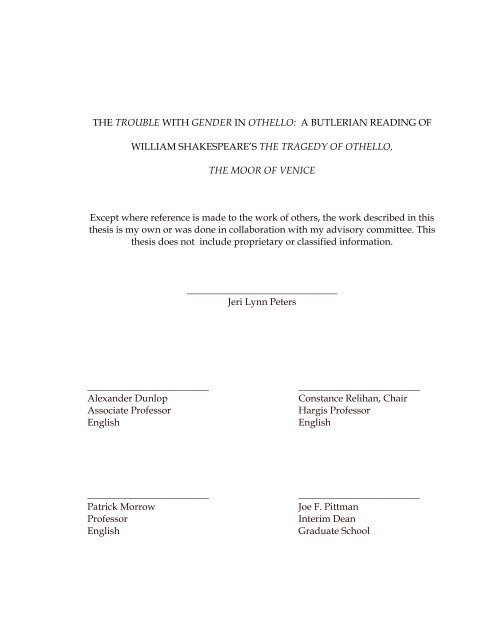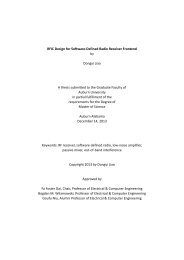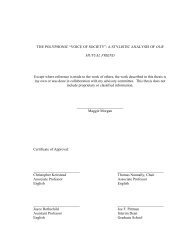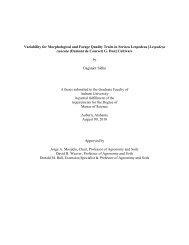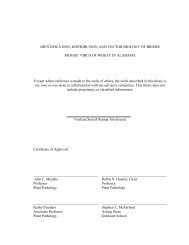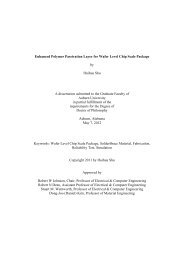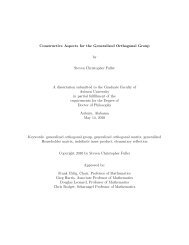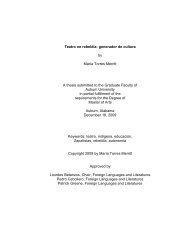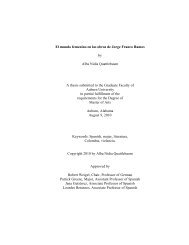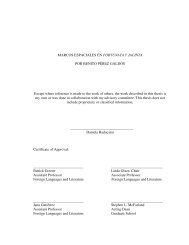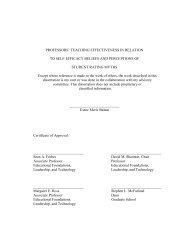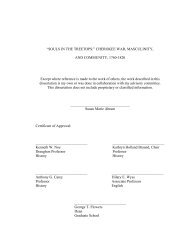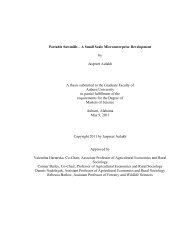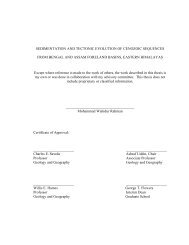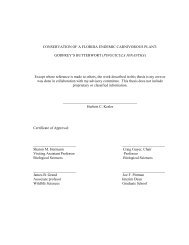the trouble with gender in othello - Auburn University Electronic ...
the trouble with gender in othello - Auburn University Electronic ...
the trouble with gender in othello - Auburn University Electronic ...
Create successful ePaper yourself
Turn your PDF publications into a flip-book with our unique Google optimized e-Paper software.
THE TROUBLE WITH GENDER IN OTHELLO: A BUTLERIAN READING OF<br />
WILLIAM SHAKESPEARE’S THE TRAGEDY OF OTHELLO,<br />
THE MOOR OF VENICE<br />
Except where reference is made to <strong>the</strong> work of o<strong>the</strong>rs, <strong>the</strong> work described <strong>in</strong> this<br />
<strong>the</strong>sis is my own or was done <strong>in</strong> collaboration <strong>with</strong> my advisory committee. This<br />
<strong>the</strong>sis does not <strong>in</strong>clude proprietary or classified <strong>in</strong>formation.<br />
_________________________<br />
Alexander Dunlop<br />
Associate Professor<br />
English<br />
_________________________<br />
Patrick Morrow<br />
Professor<br />
English<br />
_______________________________<br />
Jeri Lynn Peters<br />
_________________________<br />
Constance Relihan, Chair<br />
Hargis Professor<br />
English<br />
_________________________<br />
Joe F. Pittman<br />
Interim Dean<br />
Graduate School
THE TROUBLE WITH GENDER IN OTHELLO: A BUTLERIAN READING OF<br />
WILLIAM SHAKESPEARE’S THE TRAGEDY OF OTHELLO,<br />
THE MOOR OF VENICE<br />
Jeri Lynn Peters<br />
A Thesis<br />
Submitted to<br />
<strong>the</strong> Graduate Faculty of<br />
<strong>Auburn</strong> <strong>University</strong><br />
<strong>in</strong> Partial Fulfillment of <strong>the</strong><br />
Requirements for <strong>the</strong><br />
Degree of<br />
Master of Arts<br />
<strong>Auburn</strong>, Alabama<br />
August 4, 2007
THE TROUBLE WITH GENDER IN OTHELLO: A BUTLERIAN READING OF<br />
WILLIAM SHAKESPEARE’S THE TRAGEDY OF OTHELLO,<br />
THE MOOR OF VENICE<br />
Jeri Lynn Peters<br />
Permission is granted to <strong>Auburn</strong> <strong>University</strong> to make copies of this <strong>the</strong>sis at its<br />
discretion, upon request of <strong>in</strong>dividuals or <strong>in</strong>stitutions and at <strong>the</strong>ir expense.<br />
The author reserves all publication rights.<br />
iii<br />
_____________________________<br />
Signature of Author<br />
____________________________<br />
Date of Graduation
THESIS ABSTRACT<br />
THE TROUBLE WITH GENDER IN OTHELLO: A BUTLERIAN READING OF<br />
WILLIAM SHAKESPEARE’S THE TRAGEDY OF OTHELLO,<br />
THE MOOR OF VENICE<br />
Jeri Lynn Peters<br />
Master of Arts, August 4, 2007<br />
(BS., Troy <strong>University</strong> Dothan, 2005)<br />
47 Pages<br />
Directed by Constance Relihan<br />
By apply<strong>in</strong>g <strong>the</strong> <strong>the</strong>ories of <strong>gender</strong> as performance developed by fem<strong>in</strong>ist<br />
<strong>the</strong>orist Judith Butler <strong>in</strong> her 1990 work, Gender Trouble, to <strong>the</strong> canonical text of<br />
William Shakespeare’s The Tragedy of O<strong>the</strong>llo, The Moor of Venice, this <strong>the</strong>sis seeks<br />
to prove that <strong>the</strong> primary causes of <strong>the</strong> action of <strong>the</strong> play are <strong>the</strong> flaws <strong>in</strong><br />
Desdemona and O<strong>the</strong>llo’s <strong>gender</strong> performance, as well as Iago’s <strong>in</strong>ability to<br />
tolerate <strong>the</strong>se flaws.<br />
iv
Acknowledgments<br />
In Honor of Fred Feag<strong>in</strong><br />
The author would like to thank her husband, Kev<strong>in</strong>, and sons, Dean and<br />
Spencer, or <strong>the</strong>ir patience, love, and support dur<strong>in</strong>g <strong>the</strong> writ<strong>in</strong>g of this <strong>the</strong>sis, and<br />
her fa<strong>the</strong>r for teach<strong>in</strong>g her to love Shakespeare. She would also like to thank <strong>the</strong><br />
many friends who supported her dur<strong>in</strong>g <strong>the</strong> writ<strong>in</strong>g process, most particularly<br />
Steven Page and Hea<strong>the</strong>r Crocker.<br />
v
Style Manual Used: Modern Language Association<br />
Computer software used: Microsoft Office Word 2003<br />
vi
TABLE OF CONTENTS<br />
INTRODUCTION: THE MATRIX REVOLUTIONS...................................................1<br />
SECTION ONE: DESDEMONA IN THE MATRIX ....................................................5<br />
SECTION TWO: OTHELLO IN THE MATRIX.........................................................20<br />
SECTION THREE: IAGO IN THE MATRIX..............................................................27<br />
SECTION FOUR: CONCLUSION: THE MATRIX RESTORED..............................34<br />
WORKS CITED................................................................................................................37<br />
NOTES ..............................................................................................................................40<br />
vii
Introduction: The Matrix Revolutions<br />
In 1990, Judith Butler published Gender Trouble, a work that had a<br />
profound impact on fem<strong>in</strong>ist politics, as well as literary and cultural studies. In<br />
it, she writes:<br />
The pro-sexuality movement <strong>with</strong><strong>in</strong> fem<strong>in</strong>ist <strong>the</strong>ory and practice<br />
has effectively argued that sexuality is always constructed <strong>with</strong><strong>in</strong><br />
<strong>the</strong> terms of discourse and power, where power is partially<br />
understood <strong>in</strong> terms of heterosexual and phallic cultural<br />
conventions. […]If sexuality is culturally constructed <strong>with</strong><strong>in</strong><br />
exist<strong>in</strong>g power relations, <strong>the</strong>n <strong>the</strong> postulation of a normative<br />
sexuality that is ‘before,’ ‘outside,’ or ‘beyond’ power is a cultural<br />
impossibility and a politically impracticable dream, one that post-<br />
pones <strong>the</strong> concrete and contemporary task of reth<strong>in</strong>k<strong>in</strong>g subversive<br />
possibilities for sexuality and identity <strong>with</strong><strong>in</strong> <strong>the</strong> terms of power<br />
itself. This critical task presumes, of course, that to operate <strong>with</strong><strong>in</strong><br />
<strong>the</strong> matrix of power is not <strong>the</strong> same as to replicate uncritically<br />
relations of dom<strong>in</strong>ation. (Butler 30)<br />
1
If, as Butler writes, <strong>the</strong>re is no practical possibility of form<strong>in</strong>g a sexuality outside<br />
of <strong>the</strong> cultural, “matrix of power” (which must be at least “partially understood<br />
<strong>in</strong> terms of heterosexual and phallic cultural conventions”) <strong>the</strong>n it is of course<br />
important that we address <strong>the</strong> “task of reth<strong>in</strong>k<strong>in</strong>g subversive possibilities for<br />
sexuality and identity <strong>with</strong><strong>in</strong> <strong>the</strong> terms of power itself.” Butler herself does this<br />
by careful exam<strong>in</strong>ations of <strong>the</strong> cultures of drag and butch/femme lesbians,<br />
among o<strong>the</strong>r fr<strong>in</strong>ge sexualities, conclud<strong>in</strong>g that <strong>the</strong>se are <strong>in</strong> fact not replications<br />
of <strong>the</strong> “matrix of power,” but subversions.<br />
However, must we only look at <strong>the</strong>se possibilities <strong>in</strong> our own time? It is<br />
appropriate to look for examples of transgression and subversion of <strong>the</strong> “matrix<br />
of power” <strong>with</strong><strong>in</strong> earlier works of literature and art as well, particularly those<br />
prom<strong>in</strong>ent <strong>in</strong> <strong>the</strong> western canon, because it is impossible to ignore <strong>the</strong> impact<br />
that many of <strong>the</strong>se works have had on western culture. Therefore, this <strong>the</strong>sis will<br />
exam<strong>in</strong>e William Shakespeare’s O<strong>the</strong>llo us<strong>in</strong>g <strong>the</strong> above quote, as well as o<strong>the</strong>rs<br />
from Gender Trouble, to exam<strong>in</strong>e ways <strong>in</strong> which <strong>the</strong> characters Desdemona and<br />
O<strong>the</strong>llo form “subversive” identities <strong>with</strong><strong>in</strong> <strong>the</strong> “matrix of power” that exists<br />
<strong>with</strong><strong>in</strong> <strong>the</strong> text, as well as <strong>the</strong> “matrix of power” <strong>in</strong> which <strong>the</strong> fictive work was<br />
created.<br />
A primary reason for choos<strong>in</strong>g O<strong>the</strong>llo for Butlerian exam<strong>in</strong>ation is that, as<br />
Michael Neill states, O<strong>the</strong>llo is “a play that has rightly come to be identified as a<br />
foundational text” (Neill 361). The play is a core work of <strong>the</strong> western canon, and<br />
2
is one that is familiar to even casual readers of Shakespeare. A fur<strong>the</strong>r reason for<br />
this choice is that <strong>the</strong> text of O<strong>the</strong>llo is particularly ripe for this type of Butlerian<br />
read<strong>in</strong>g because so much of <strong>the</strong> action of <strong>the</strong> play is concerned <strong>with</strong> who is<br />
sleep<strong>in</strong>g <strong>with</strong> whom, who is be<strong>in</strong>g transgressive <strong>with</strong> whom, and <strong>the</strong> perception<br />
of sexual subversion and both sexual and social transgression is at <strong>the</strong> very core<br />
of <strong>the</strong> pathos of <strong>the</strong> play itself. If, as Margaret Sonser Breen writes, “Gender<br />
Trouble provides a <strong>the</strong>oretical framework for understand<strong>in</strong>g <strong>the</strong> punitive social<br />
consequences of <strong>gender</strong> and sexual transgression,” (Breen 147) <strong>the</strong>n <strong>in</strong> O<strong>the</strong>llo we<br />
see <strong>the</strong>se punitive social consequences brought about coldly and calculatedly by<br />
Iago.<br />
View<strong>in</strong>g <strong>the</strong> text through <strong>the</strong> lens of Butlerian <strong>the</strong>ory allows us to not only<br />
see Desdemona as a strong, subversive woman who is will<strong>in</strong>g to transgress her<br />
social roles as daughter, and even wife at times through her “<strong>in</strong>correct” <strong>gender</strong><br />
performance and disregard for status as “object” and her <strong>in</strong>sistence of be<strong>in</strong>g<br />
perceived as an act<strong>in</strong>g “subject,” but also to exam<strong>in</strong>e <strong>the</strong> ways <strong>in</strong> which it is <strong>the</strong><br />
“punitive social consequences” of her actions that lead to her death. In addition,<br />
by broaden<strong>in</strong>g Butler’s scope slightly (for she is most concerned <strong>with</strong> <strong>the</strong> way<br />
society effects <strong>the</strong> <strong>gender</strong> performance of women) we may exam<strong>in</strong>e how <strong>the</strong><br />
script of “an oppressive status quo” (Faulluga) also controls <strong>the</strong> actions and<br />
identities of <strong>the</strong> men <strong>in</strong> <strong>the</strong> text, specifically O<strong>the</strong>llo and Iago.<br />
3
Ano<strong>the</strong>r benefit of this type of read<strong>in</strong>g of O<strong>the</strong>llo is that by look<strong>in</strong>g at <strong>the</strong><br />
reactions to Desdemona’s and O<strong>the</strong>llo’s disruptions of patriarchal society gives<br />
us an excit<strong>in</strong>g <strong>in</strong>sight <strong>in</strong>to two more of <strong>the</strong> ongo<strong>in</strong>g debates <strong>in</strong> O<strong>the</strong>llo criticism:<br />
What are Iago’s “true” motivations and why is O<strong>the</strong>llo so easily conv<strong>in</strong>ced that<br />
his “fair warrior” is a “whore”? Both of <strong>the</strong>se questions can be answered by<br />
tak<strong>in</strong>g <strong>in</strong>to account <strong>the</strong> importance of <strong>gender</strong> performance to <strong>the</strong>se characters.<br />
4
Section One:<br />
Desdemona <strong>in</strong> <strong>the</strong> Matrix<br />
Tak<strong>in</strong>g as a given Butler’s statement that: “sexuality is culturally<br />
constructed” and <strong>the</strong>re is no way to construct a sexuality “‘before,’ ‘outside’ or<br />
‘beyond’’ <strong>the</strong> “matrix of power” from which it is a “cultural impossibility” to<br />
escape, let us first turn our attention to Desdemona’s transgressions, and <strong>the</strong><br />
ways <strong>in</strong> which <strong>the</strong>y serve as “displacements” of <strong>the</strong> “relations of dom<strong>in</strong>ation”<br />
(Butler 30) <strong>with</strong><strong>in</strong> <strong>the</strong> text of O<strong>the</strong>llo.<br />
The first form of Desdemona’s transgression is her disobedience to her<br />
fa<strong>the</strong>r by elop<strong>in</strong>g <strong>with</strong> O<strong>the</strong>llo. Perhaps this aspect of Desdemona’s disruptive<br />
transgressions is less exam<strong>in</strong>ed by literary critics discuss<strong>in</strong>g O<strong>the</strong>llo because <strong>the</strong><br />
matter of her marry<strong>in</strong>g outside her race (which I shall deal <strong>with</strong> <strong>in</strong> a later portion<br />
of this <strong>the</strong>sis) is more “<strong>in</strong> your face”; one sees Desdemona <strong>with</strong> her “O<strong>the</strong>r”<br />
throughout <strong>the</strong> action while <strong>the</strong> <strong>in</strong>itial act of disobedience occurs before <strong>the</strong><br />
action of <strong>the</strong> play beg<strong>in</strong>s. Although <strong>the</strong> matter of Desdemona’s and O<strong>the</strong>llo’s<br />
elopement takes up <strong>the</strong> vast majority of <strong>the</strong> dialogue and action of Act I, <strong>the</strong><br />
actual act occurs off stage. Or perhaps, it is because <strong>the</strong> trope of <strong>the</strong> young<br />
people pull<strong>in</strong>g <strong>the</strong> wool over <strong>the</strong> eyes of <strong>the</strong>ir elders is readily accepted <strong>in</strong><br />
comedy, Shakespearean and o<strong>the</strong>rwise. However, it must be borne <strong>in</strong> m<strong>in</strong>d that<br />
<strong>in</strong> <strong>the</strong> comedies, <strong>the</strong> action nearly always ends <strong>with</strong> <strong>the</strong> marriage and more often<br />
than not, <strong>with</strong> <strong>the</strong> grudg<strong>in</strong>g, if not joyful, parental approval. O<strong>the</strong>llo, like Romeo<br />
5
and Juliet show what happens after <strong>the</strong> comedy ends: “Plays that cont<strong>in</strong>ue<br />
beyond <strong>the</strong> po<strong>in</strong>t where comedy ends, <strong>with</strong> <strong>the</strong> old fogies defeated and a happy<br />
marriage successfully concluded, depict <strong>the</strong> condition as utterly disastrous”<br />
(Orgel 674). It should also be borne <strong>in</strong> m<strong>in</strong>d that while <strong>the</strong> <strong>the</strong>me of children<br />
subvert<strong>in</strong>g <strong>the</strong>ir parents is a <strong>the</strong>atrical convention that dates back to <strong>the</strong> Greek<br />
and Roman <strong>the</strong>ater:<br />
The degree to which this dramatized generation gap reflected<br />
actual social conditions rema<strong>in</strong>s highly problematic, but,<br />
presumably patriarchs <strong>in</strong> <strong>the</strong> audience participated <strong>in</strong> <strong>the</strong> laughter<br />
at <strong>the</strong> obtuse sennex (sic) foiled by his canny children even as <strong>the</strong>y<br />
returned to <strong>the</strong>ir homes to exert <strong>the</strong>ir patriarchal, and often<br />
tyrannical, power over <strong>the</strong>ir own offspr<strong>in</strong>g. (Lenker 22)<br />
It is a safe assumption, accord<strong>in</strong>g to historians deal<strong>in</strong>g <strong>with</strong> <strong>the</strong> time period, that<br />
no matter what happened on <strong>the</strong> stage of a comedy, <strong>the</strong> patriarchy was alive and<br />
well <strong>in</strong> Shakespeare’s England (Lenker 17-19). 1 Lawrence Stone hypo<strong>the</strong>sizes<br />
that <strong>the</strong>re was an <strong>in</strong>creased enforcement of patriarchy dur<strong>in</strong>g <strong>the</strong> early modern<br />
period:<br />
The growth of patriarchy was deliberately encouraged by <strong>the</strong> new<br />
Renaissance state on <strong>the</strong> traditional grounds that <strong>the</strong> subord<strong>in</strong>ation<br />
of <strong>the</strong> family to its head is analogous to, and also a direct<br />
contributory cause of, subord<strong>in</strong>ation of subjects to <strong>the</strong> sovereign.<br />
6
In 1609 James I <strong>in</strong>formed his somewhat dubious subjects that ‘<strong>the</strong><br />
state of monarchy is <strong>the</strong> supremest th<strong>in</strong>g upon earth,’ one of his<br />
arguments be<strong>in</strong>g that ‘K<strong>in</strong>gs are compared to fa<strong>the</strong>rs <strong>in</strong> families: for<br />
a K<strong>in</strong>g is truly parens patriae, <strong>the</strong> political fa<strong>the</strong>r of his people.<br />
(Stone 110)<br />
The k<strong>in</strong>gdom was <strong>the</strong> macrocosm, <strong>the</strong> family was <strong>the</strong> microcosm, and <strong>in</strong> both<br />
<strong>the</strong> fa<strong>the</strong>r ruled by a div<strong>in</strong>e right. Therefore, we can place Desdemona’s<br />
transgression culturally “<strong>with</strong><strong>in</strong> <strong>the</strong> terms of discourse and power, where power<br />
is partially understood <strong>in</strong> terms of heterosexual and phallic cultural<br />
conventions,” (Butler 30) both early modern England <strong>in</strong> which Shakespeare<br />
created <strong>the</strong> character and early modern Venice <strong>in</strong> which <strong>the</strong> fictive action of <strong>the</strong><br />
text takes place are repressive patriarchies; <strong>the</strong>refore, Desdemona’s action are<br />
<strong>in</strong>deed disruptive. Stone fur<strong>the</strong>r writes:<br />
Patriarchy for its effective exercise depends not so much on raw<br />
power or legal authority, as on recognition by all concerned of its<br />
legitimacy, hallowed by ancient tradition, moral <strong>the</strong>ology, and<br />
political <strong>the</strong>ory. It survives and flourishes only so long as it is not<br />
questioned and challenged, so long as both <strong>the</strong> patriarchs and <strong>the</strong>ir<br />
subord<strong>in</strong>ates fully accept <strong>the</strong> natural justice of <strong>the</strong> relationship of<br />
<strong>the</strong> norms <strong>with</strong> which it is exercised. Will<strong>in</strong>g acceptance of <strong>the</strong><br />
7
legitimacy of <strong>the</strong> authority, […] are <strong>the</strong> keys to <strong>the</strong> whole system.<br />
(Stone 109)<br />
If <strong>the</strong> entire system of patriarchal authority depends on <strong>the</strong> “will<strong>in</strong>g acceptance”<br />
of those subjected by it, (as well as those who must, perforce do <strong>the</strong> subject<strong>in</strong>g)<br />
Desdemona’s action <strong>in</strong> elop<strong>in</strong>g is <strong>with</strong>out a doubt a socially transgressive action,<br />
but can also be classified as a sexual transgression for several reasons. First<br />
among <strong>the</strong>se reasons is that she disobeys her fa<strong>the</strong>r to whom she owes “life and<br />
education” for, all <strong>in</strong>tents and purposes, sex. While it is easy to discount <strong>the</strong><br />
sexual aspect of marriage when deal<strong>in</strong>g <strong>with</strong> historical periods <strong>in</strong> which<br />
contractual marriage was <strong>the</strong> norm, <strong>the</strong> sexual element must not be overlooked,<br />
not least of which because of <strong>the</strong> procreative nature of marriage. To a man such<br />
as Brabantio, a nobleman who has no o<strong>the</strong>r child besides Desdemona, it is not<br />
only her “fortunes” that are now tied to <strong>the</strong> Moor, but Brabantio’s genetic l<strong>in</strong>eage<br />
and monetary wealth as well; <strong>the</strong> overarch<strong>in</strong>g importance of dynastic marriage,<br />
<strong>the</strong> purpose of pass<strong>in</strong>g on wealth and family traits is one <strong>the</strong> tools that Iago uses<br />
so effectively to raise Brabantio’s ire aga<strong>in</strong>st his daughter and new son <strong>in</strong> law:<br />
“<strong>the</strong> devil will make a grandsire of you. […] you’ll have your nephews neigh to<br />
you; you’ll have coursers for cous<strong>in</strong>s, and gennets for germans” (I.i.99, 124-126).<br />
Therefore, what should seem a private choice becomes a matter for<br />
dynastic concern. Return<strong>in</strong>g to Butler, specifically her explication of Levi-<br />
Strauss’ The Elementary Structures of K<strong>in</strong>ship, will help to illum<strong>in</strong>ate <strong>the</strong> depth of<br />
8
Desdemona’s transgression <strong>in</strong> her refus<strong>in</strong>g to perform her role as daughter/<br />
“reflect”ion of mascul<strong>in</strong>e identity properly:<br />
The bride functions as a relational term between groups of men;<br />
she does not have an identity, and nei<strong>the</strong>r does she exchange one<br />
identity for ano<strong>the</strong>r. She reflects mascul<strong>in</strong>e identity precisely<br />
through be<strong>in</strong>g <strong>the</strong> site of its absence.[…] As wives, women not only<br />
secure <strong>the</strong> reproduction of <strong>the</strong> name (<strong>the</strong> functional purpose) but<br />
affect a symbolic <strong>in</strong>tercourse between clans of men. […]<strong>the</strong><br />
woman <strong>in</strong> marriage qualifies not as an identity, but only as a<br />
relational term that both dist<strong>in</strong>guishes and b<strong>in</strong>ds <strong>the</strong> various clans.<br />
(Butler 39. Emphasis orig<strong>in</strong>al to <strong>the</strong> text)<br />
Ergo, Desdemona has forced her fa<strong>the</strong>r to “<strong>in</strong>tercourse” <strong>with</strong> a patril<strong>in</strong>eal group<br />
he did not choose. Fur<strong>the</strong>r, by elop<strong>in</strong>g she rejects her role as a “reflection” or<br />
“symbolic exchange” and <strong>in</strong>stead claims an identity for herself, reject<strong>in</strong>g her<br />
identity as “Brabantio’s daughter.”<br />
As <strong>the</strong> fem<strong>in</strong>ist mantra goes, “<strong>the</strong> private is political”; it is impossible, <strong>in</strong><br />
any patriarchy where women must be trusted carry<strong>in</strong>g children (and <strong>the</strong>refore,<br />
<strong>with</strong> pass<strong>in</strong>g on genetics as well as fortunes) to separate a social transgression<br />
from a sexual transgression. For a Butlerian read<strong>in</strong>g such as this <strong>the</strong> dist<strong>in</strong>ction<br />
is even less important because, as D<strong>in</strong>o Falluga expla<strong>in</strong>s:<br />
9
For Butler, <strong>the</strong> dist<strong>in</strong>ction between <strong>the</strong> personal and <strong>the</strong> political is<br />
itself a fiction designed to support an oppressive status quo: Our<br />
most personal acts are, <strong>in</strong> fact, cont<strong>in</strong>ually be<strong>in</strong>g scripted by<br />
hegemonic social conventions and ideologies. (Falluga)<br />
There<strong>in</strong> lies <strong>the</strong> crux of Desdemona’s sexually transgressivity. If her most<br />
personal choices are scripted by an “oppressive status quo,” Desdemona has, to<br />
cont<strong>in</strong>ue <strong>the</strong> performance metaphor, gone off <strong>the</strong> page. By her elopement <strong>with</strong><br />
O<strong>the</strong>llo, she has defied <strong>the</strong> script Venetian society has written for her, and begun<br />
to improvise. As Butler has shown us, it is impossible to separate <strong>the</strong> private<br />
from <strong>the</strong> public, because all are governed by <strong>the</strong> “matrix of power” <strong>in</strong> which <strong>the</strong>y<br />
are formed. Therefore, Desdemona’s decision to marry <strong>with</strong>out permission is<br />
both a social and sexual transgression.<br />
Desdemona’s speech to her fa<strong>the</strong>r <strong>in</strong> I.iii. offers fur<strong>the</strong>r <strong>in</strong>sight <strong>in</strong>to<br />
Desdemona’s will<strong>in</strong>gness to subvert <strong>the</strong> patriarchy. While couched <strong>in</strong> <strong>the</strong><br />
language of dutiful submissiveness, <strong>the</strong>re is a streak of “will”; a “will most rank”<br />
<strong>in</strong> <strong>the</strong> m<strong>in</strong>d of a patriarchal traditionalist such as Iago (III.iii. 265):<br />
My noble fa<strong>the</strong>r,<br />
I do perceive here a divided duty.<br />
To you I am bound for life and education;<br />
My life and education both do learn me<br />
How to respect you. You are <strong>the</strong> lord of duty;<br />
10
I am hi<strong>the</strong>rto your daughter. But, here’s my husband;<br />
And so much duty as my mo<strong>the</strong>r showed<br />
To you, preferr<strong>in</strong>g you before her fa<strong>the</strong>r,<br />
So much I challenge that I may profess<br />
Due to <strong>the</strong> Moor my lord. (I.iii. 198-207. Emphasis m<strong>in</strong>e)<br />
Even while us<strong>in</strong>g <strong>the</strong> words of submissive words appropriate to a daughter<br />
address<strong>in</strong>g her fa<strong>the</strong>r, “operat<strong>in</strong>g <strong>with</strong><strong>in</strong> <strong>the</strong> matrix of power” as it were,<br />
Desdemona is disrupt<strong>in</strong>g <strong>the</strong> patriarchal control (Dash 105) her fa<strong>the</strong>r seeks to<br />
exert over her…and she knows it. Desdemona is completely unapologetic for<br />
her disruption. Throughout Act I, Desdemona has been identified as object, i.e.,<br />
my daughter, his daughter, my wife, etc. But here, Desdemona steps out of <strong>the</strong><br />
role of object and becomes a subject, <strong>in</strong> <strong>the</strong> process mak<strong>in</strong>g Brabantio and O<strong>the</strong>llo<br />
objects, “my fa<strong>the</strong>r, my husband.” Brabantio never identifies himself as<br />
Desdemona’s fa<strong>the</strong>r, O<strong>the</strong>llo never as Desdemona’s husband, reserv<strong>in</strong>g for<br />
<strong>the</strong>mselves an identity separate from her. By referr<strong>in</strong>g to O<strong>the</strong>llo as “my<br />
husband” and Barbantio as “my fa<strong>the</strong>r”, it is she who objectifies <strong>the</strong> men,<br />
claim<strong>in</strong>g for herself <strong>the</strong> separate identity. While Desdemona is respectful <strong>in</strong> her<br />
dissent (she consistently uses <strong>the</strong> more respectful “you” appropriate for<br />
address<strong>in</strong>g someone of higher rank than oneself), she is unapologetic.<br />
It is not only <strong>the</strong> way Desdemona addresses her fa<strong>the</strong>r <strong>in</strong> this speech that<br />
makes her words transgressive, but also <strong>the</strong> way she speaks of herself. To<br />
11
fur<strong>the</strong>r understand <strong>the</strong> subversion <strong>in</strong>herent <strong>in</strong> Desdemona’s speech, let us look at<br />
Butler’s explication of Wittig’s discussion of <strong>the</strong> use of <strong>the</strong> word “I” by a woman.<br />
A woman cannot use <strong>the</strong> first person “I” because as a woman, <strong>the</strong><br />
speaker is ‘particular’ (relative, <strong>in</strong>terested, perspectival), and <strong>the</strong><br />
<strong>in</strong>vocation of <strong>the</strong> “I” presumes <strong>the</strong> capacity to speak for and as <strong>the</strong><br />
universal human. […]This privilege to speak “I” establishes a<br />
sovereign self, a center of absolute plenitude and power; speak<strong>in</strong>g<br />
establishes ‘<strong>the</strong> supreme act of subjectivity’ This com<strong>in</strong>g <strong>in</strong>to<br />
subjectivity is <strong>the</strong> effective overthrow of sex and hence, <strong>the</strong><br />
fem<strong>in</strong><strong>in</strong>e; ‘no woman can say I <strong>with</strong>out be<strong>in</strong>g for herself a total<br />
subject—that is un<strong>gender</strong>ed, universal, whole’ (Butler 117)<br />
Desdemona, seem<strong>in</strong>gly <strong>with</strong>out fear or apology, claims <strong>the</strong> privilege to speak ‘I’<br />
<strong>in</strong> this speech. Not only does she <strong>with</strong> her first l<strong>in</strong>e of speech change her fa<strong>the</strong>r<br />
from a subject, one who claims “my daughter” repeatedly, to an object, “my<br />
fa<strong>the</strong>r”, but <strong>with</strong> <strong>the</strong> second l<strong>in</strong>e she takes for herself full subjectivity; “effectively<br />
overthrow(<strong>in</strong>g)” her <strong>gender</strong>. This is, of course, a complete subversion of her<br />
<strong>gender</strong> performance.<br />
This is only <strong>the</strong> beg<strong>in</strong>n<strong>in</strong>g of Desdemona’s <strong>in</strong>sistence upon be<strong>in</strong>g<br />
perceived as a subject, not just an object of possession, <strong>in</strong> Act I. When it is<br />
mandated that O<strong>the</strong>llo must go to Cyprus, <strong>the</strong> Duke proposes that Desdemona<br />
should return home <strong>with</strong> her fa<strong>the</strong>r. Both Brabantio and O<strong>the</strong>llo dismiss this<br />
12
idea, which socially should have been enough to prevent it. However<br />
superfluous her protestation is, Desdemona still registers it: “Nor would I <strong>the</strong>re<br />
reside,/ to put my fa<strong>the</strong>r <strong>in</strong> impatient thoughts/ by be<strong>in</strong>g <strong>in</strong> his eye” (I.iii.263-<br />
265). Desdemona will not sit idly by and allow <strong>the</strong> men to determ<strong>in</strong>e her<br />
dest<strong>in</strong>y. Not only does she register her displeasure <strong>with</strong> <strong>the</strong> idea of be<strong>in</strong>g sent<br />
home to her fa<strong>the</strong>r, “Desdemona speaks at length, offer<strong>in</strong>g several reasons<br />
aga<strong>in</strong>st <strong>the</strong> Duke’s plan” (Dash 108)and she is <strong>the</strong> only of <strong>the</strong> three of <strong>the</strong>m to<br />
propose a solution to <strong>the</strong> matter of “fit disposition” ( I.iii.255) for her while<br />
O<strong>the</strong>llo is <strong>in</strong> Cyprus.<br />
O<strong>the</strong>r than sexual organs, accord<strong>in</strong>g to Butler, <strong>the</strong>re are no “natural”<br />
aspects of <strong>gender</strong>: “Consider that sedimentation of <strong>gender</strong> norms produces <strong>the</strong><br />
peculiar phenomenon of a ‘natural sex’ or a ‘real woman’ or any number of<br />
prevalent and compell<strong>in</strong>g social fictions” (Butler 140). Natural <strong>gender</strong> attributes<br />
are a myth. But, <strong>with</strong><strong>in</strong> <strong>the</strong> text of O<strong>the</strong>llo, this mythology of ei<strong>the</strong>r “natural” or<br />
“unnatural” <strong>gender</strong> performance is predom<strong>in</strong>ant. In fact, one of <strong>the</strong> most<br />
compell<strong>in</strong>g charges Iago (and Brabantio, we must never discount <strong>the</strong> impact of<br />
his judgment upon Desdemona has on O<strong>the</strong>llo) br<strong>in</strong>gs to bear is two-fold, and<br />
both aspects of it have to do <strong>with</strong> her nature: 1. That it is un-natural (i.e.,<br />
contrary to her <strong>gender</strong>, which is <strong>in</strong>separable from her race, culture, and status)<br />
for her to physically desire O<strong>the</strong>llo because of his race; and 2. That it is natural<br />
13
(i.e., fitt<strong>in</strong>g her <strong>gender</strong>, race, culture and status) for her to sooner or later become<br />
unfaithful.<br />
In Act I, Brabantio is so conv<strong>in</strong>ced that it would be unth<strong>in</strong>kable for his<br />
daughter to “run from her guardage to <strong>the</strong> sooty bosom/ […] to fear, not to<br />
delight” (I.ii.85-86) that he suspects witchcraft. Some of his response may be<br />
simple denial and some can be attributed to how he perceives Desdemona’s<br />
personality; however, if “<strong>gender</strong> is an identity tenuously constituted <strong>in</strong> time,<br />
<strong>in</strong>stituted <strong>in</strong> an exterior space through a stylized repetition of acts” (Butler 140<br />
Emphasis orig<strong>in</strong>al to text) <strong>the</strong>n we can not separate Brabantio’s perception of<br />
Desdemona’s <strong>gender</strong> performance, i.e. what he believes to be her natural state of<br />
behavior, from her <strong>gender</strong> performance itself. To put it ano<strong>the</strong>r way,<br />
Desdemona has performed her <strong>gender</strong> so well to this po<strong>in</strong>t, that Brabantio has<br />
<strong>trouble</strong> believ<strong>in</strong>g that she would capable of go<strong>in</strong>g off <strong>the</strong> page so drastically:<br />
“For nature so prepost’rously to err,/be<strong>in</strong>g not deficient, bl<strong>in</strong>d, or lame of<br />
sense,/sans witchcraft could not” (I.iii.70-72) It is not only <strong>the</strong> shock<strong>in</strong>g act of<br />
“gross revolt” (I.i.148) that leads to Brabantio’s disbelieve, though that is an<br />
<strong>in</strong>tegral part of it, it is also <strong>the</strong> fact that O<strong>the</strong>llo is a Moor.<br />
Heretofore, I have only dealt <strong>with</strong> her act of disobedience, her <strong>in</strong>sistence<br />
on be<strong>in</strong>g recognized as an act<strong>in</strong>g subject <strong>in</strong> her own dest<strong>in</strong>y. While that is a large<br />
part of her “unnatural” <strong>gender</strong> performance so stressed by her fa<strong>the</strong>r (and Iago,<br />
as we will discuss shortly), however, it is not only <strong>the</strong> fact that she married<br />
14
<strong>with</strong>out her fa<strong>the</strong>r’s permission that is problematic. The fact that she not only<br />
chooses for herself, but chooses a man not of her “clime, culture (or) degree”<br />
(III.iii.263) can not be discounted. Her disobedience and will<strong>in</strong>gness to disrupt<br />
<strong>the</strong> social order (by marry<strong>in</strong>g outside her class, culture, and even race) are both<br />
edges of <strong>the</strong> sword that Iago uses, and <strong>the</strong>refore both must be discussed.<br />
In <strong>the</strong> early modern m<strong>in</strong>d, it is supremely unnatural for a white woman to<br />
want a black man 2 . That Desdemona should so “err from nature” would be<br />
<strong>in</strong>dicative of her ‘unnatural’ <strong>the</strong>refore, wrong, <strong>gender</strong> performance. The very<br />
fact of her miscengentistic marriage, both <strong>with</strong><strong>in</strong> <strong>the</strong> script of <strong>the</strong> play and <strong>the</strong><br />
societal script that existed <strong>in</strong> <strong>the</strong> culture <strong>in</strong> which <strong>the</strong> play was crated, makes<br />
Desdemona deviant from her <strong>gender</strong> performance. That <strong>the</strong> belief that<br />
Desdemona’s desire for a man not of her “clime, complexion, and<br />
degree”(III.iii.263) would have been deemed deviant was deeply <strong>in</strong>gra<strong>in</strong>ed <strong>in</strong><br />
<strong>the</strong> psyche of <strong>the</strong> males <strong>in</strong> <strong>the</strong> play is seen by <strong>the</strong> fact that it is O<strong>the</strong>llo himself<br />
who first comments, when Iago first beg<strong>in</strong>s to plant <strong>the</strong> seeds of Desdemona’s<br />
disobedience <strong>in</strong> his m<strong>in</strong>d: “I do not th<strong>in</strong>k but Desdemona’s honest.[…] And yet,<br />
how nature err<strong>in</strong>g from itself-‘’(III.iii.259, 263). Iago, see<strong>in</strong>g <strong>the</strong> open<strong>in</strong>g, jumps<br />
<strong>in</strong> immediately, driv<strong>in</strong>g home <strong>the</strong> ‘fact’ that Desdemona’s rejection of any man<br />
“of her own clime, complexion, and degree, whereto we see <strong>in</strong> all th<strong>in</strong>gs nature<br />
tends—Foh! One may smell <strong>in</strong> such a will most rank, foul disproportion,<br />
thoughts unnatural”( III.iii.263-266).<br />
15
Therefore, <strong>the</strong> fact of Desdemona’s “break<strong>in</strong>g <strong>the</strong> script,” as it were, by her<br />
desire for a black man is just as <strong>in</strong>crim<strong>in</strong>at<strong>in</strong>g as her act of disobedience. These<br />
two “errors” <strong>in</strong> her <strong>gender</strong> performance are <strong>the</strong> keys to her destruction.<br />
Conversely, even perversely, however Desdemona would be doomed by <strong>the</strong><br />
script, even if she had never “err’d from nature”. It is not only <strong>the</strong> places where<br />
Desdemona follows <strong>the</strong> script that dooms her; it is <strong>the</strong> script itself. Iago ties<br />
toge<strong>the</strong>r <strong>the</strong> arguments that because Desdemona violated <strong>the</strong> script once, she<br />
must do it aga<strong>in</strong> <strong>with</strong> <strong>the</strong> argument that all women, sooner or later, will become<br />
sexually transgressive. “It is aga<strong>in</strong>st nature,” Iago argues, “for Venetian women<br />
to sleep <strong>with</strong> Black Men.” Fair enough, but <strong>the</strong>n he cont<strong>in</strong>ues to argue, “and it is<br />
nature of women, (particularly Venetian women) to be unfaithful to <strong>the</strong>ir<br />
husbands.” It would seem that, at least <strong>in</strong> <strong>the</strong> m<strong>in</strong>d of Iago, and Rodrigo, and<br />
f<strong>in</strong>ally, O<strong>the</strong>llo himself, because a woman defies <strong>the</strong> script <strong>in</strong> some ways,<br />
(disobedience, marry<strong>in</strong>g outside her race) does not mean that she will not stick to<br />
<strong>the</strong> script <strong>in</strong> o<strong>the</strong>rs, particularly <strong>in</strong> those ways <strong>in</strong> which women are prone<br />
“naturally” to badness. But, if we agree <strong>with</strong> Butler that <strong>the</strong>re is no “natural”<br />
woman, that all of her <strong>gender</strong>ed actions are scripted by forces outside herself,<br />
Iago is conv<strong>in</strong>c<strong>in</strong>g those around him that his version of <strong>the</strong> script for “natural”<br />
women is <strong>the</strong> correct one. And <strong>in</strong> Iago’s script:<br />
You are pictures out of doors,<br />
Bells <strong>in</strong> your parlors, wildcats <strong>in</strong> your kitchens,<br />
16
Sa<strong>in</strong>ts <strong>in</strong> your <strong>in</strong>juries, devils be<strong>in</strong>g offended,<br />
Players <strong>in</strong> your housewifery, and housewives <strong>in</strong> your beds.<br />
[…] your rise to play, and go to bed to work. (II.i.125-128, 131)<br />
Iago, as I will discuss later <strong>in</strong> this <strong>the</strong>sis, performs <strong>the</strong> role of <strong>the</strong> re-enforcer of<br />
<strong>the</strong> status quo. Therefore, we can take that his “script” is <strong>the</strong> “script of <strong>the</strong><br />
oppressive status quo” (Falluga). Desdemona, had she followed <strong>the</strong> script that<br />
she was meant to, would still have been doomed. Because a prom<strong>in</strong>ent script <strong>in</strong><br />
<strong>the</strong> early 17 th century stated that women were carnal be<strong>in</strong>gs, Iago does not even<br />
have to work very hard to conv<strong>in</strong>ce O<strong>the</strong>llo of Desdemona’s treachery. O<strong>the</strong>llo<br />
has lived <strong>in</strong> Venice long enough to be aware of <strong>the</strong> script that controls <strong>the</strong><br />
patriarchy <strong>the</strong>re.<br />
However, Perhaps one of <strong>the</strong> most debated and discussed l<strong>in</strong>es <strong>in</strong> O<strong>the</strong>llo, <strong>the</strong><br />
one that causes nearly all critics that discuss <strong>the</strong> character of Desdemona are<br />
driven <strong>in</strong> one way or ano<strong>the</strong>r to expla<strong>in</strong>, are Desdemona’s dy<strong>in</strong>g words: “Emilia:<br />
O, who hath done this deed? Desdemona: Nobody—I myself.” (V.ii. 148-149)<br />
This l<strong>in</strong>e is often used to support critics’ arguments that Desdemona is<br />
complicit <strong>in</strong> her own death, ei<strong>the</strong>r by her will<strong>in</strong>gness to lie <strong>with</strong> her immortality<br />
at hand or by her supposed passivity. I would not completely disagree that<br />
Desdemona’s dy<strong>in</strong>g words and actions <strong>in</strong> her death imply a certa<strong>in</strong> complicity,<br />
but I would not agree that she is represented as deserv<strong>in</strong>g death at <strong>the</strong> hands of<br />
17
her husband. However, <strong>the</strong>re can be no denial that it is her actions, her<br />
disruptions of <strong>the</strong> patriarchy from <strong>with</strong><strong>in</strong> <strong>the</strong> discussed matrix of power that she<br />
lives <strong>in</strong>, have led to her f<strong>in</strong>al moments on stage. If <strong>the</strong> status quo is to be<br />
restored, <strong>the</strong>n those who have transgressed must be removed. Desdemona’s<br />
dy<strong>in</strong>g words are an admittance of complicity; <strong>the</strong>y are not, however, apologetic<br />
or regretful as is seen <strong>in</strong> her statement, “A guiltless death I die” (V.ii.147). If, for<br />
<strong>the</strong> patriarchal status quo to be ma<strong>in</strong>ta<strong>in</strong>ed, strict adherence to <strong>the</strong> “script” must<br />
be ma<strong>in</strong>ta<strong>in</strong>ed, <strong>the</strong>n Desdemona (as well as O<strong>the</strong>llo, whose end we shall discuss<br />
shortly) must, perforce, have an awareness of <strong>the</strong> ways <strong>in</strong> which she has violated<br />
<strong>the</strong> societal norms, <strong>the</strong> ways <strong>in</strong> which she has not performed her <strong>gender</strong> (as well<br />
as race and culture) correctly. Therefore, it was “she, herself” that made <strong>the</strong><br />
decisions that led to her violent death. With immortality at hand, Desdemona<br />
takes back her subjectivity, reclaims herself as an “I”.<br />
Desdemona, although she attempts it at times, refuses to be returned<br />
permanently to her status as object, <strong>the</strong>refore <strong>the</strong> only conclusion that will allow<br />
a return to <strong>the</strong> status quo is her death. By Iago’s mach<strong>in</strong>ations and O<strong>the</strong>llo’s<br />
actions, Desdemona is, to put it crudely, reduced back to an object. For what is<br />
more lifeless or less <strong>in</strong>dividual than a dead body? She is even referred to as such<br />
<strong>in</strong> <strong>the</strong> f<strong>in</strong>al l<strong>in</strong>es of <strong>the</strong> play: “Lodvico: Look on <strong>the</strong> tragic load<strong>in</strong>g of this bed.<br />
This is thy work. The object poisons sight: Let it be hid.”(V.ii.420-421) Fur<strong>the</strong>r,<br />
under <strong>the</strong> pressure of O<strong>the</strong>llo’s wrath Desdemona beg<strong>in</strong>s to lose her ability to<br />
18
view herself as a subject: “O<strong>the</strong>llo: Why, what art thou? / Desdemona: Your<br />
wife, my lord; your true/ and loyal wife” (IV.ii. 39-41). Desdemona has been<br />
returned to her “correct” status; an object, not an act<strong>in</strong>g subject.<br />
But it is not only <strong>the</strong> <strong>gender</strong> performance of Desdemona that leads to <strong>the</strong><br />
“tragic load<strong>in</strong>g of <strong>the</strong> bed” <strong>in</strong> Act V. As <strong>the</strong> next two sections of this <strong>the</strong>sis will<br />
explore, Iago’s and O<strong>the</strong>llo’s <strong>in</strong>vestment <strong>in</strong> <strong>the</strong>ir own <strong>gender</strong> performance as<br />
men bears as much of <strong>the</strong> responsibility for <strong>the</strong> play’s tragic end. Although <strong>the</strong><br />
fact is not given much attention by Butler, it is of course not only women who are<br />
forced by that status quo to “perform” <strong>the</strong>ir <strong>gender</strong> correctly. There must also,<br />
perforce, be a performative aspect to <strong>the</strong> performance of male <strong>gender</strong> as well. An<br />
<strong>in</strong>tegral aspect to <strong>the</strong> male performance of <strong>gender</strong> would be dependent on <strong>the</strong><br />
behavior of <strong>the</strong> women related to (by birth or marriage) <strong>the</strong>m. To be a man, as it<br />
were, one must “control” one’s women. There can be little doubt of this <strong>with</strong><strong>in</strong><br />
<strong>the</strong> text of O<strong>the</strong>llo.<br />
19
Section Two:<br />
O<strong>the</strong>llo <strong>in</strong> <strong>the</strong> Matrix<br />
We will now turn our attention away from Desdemona’s disruption of <strong>the</strong><br />
patriarchy, and turn to O<strong>the</strong>llo’s. It is not only <strong>the</strong> fact of Desdemona’s<br />
disobedience to her fa<strong>the</strong>r, her violation of The Law of <strong>the</strong> Fa<strong>the</strong>r, which is<br />
represented as offensive <strong>in</strong> her relationship <strong>with</strong> O<strong>the</strong>llo. To beg<strong>in</strong> to explicate<br />
how O<strong>the</strong>llo’s <strong>in</strong>itial treatment of Desdemona is an encouragement of her <strong>gender</strong><br />
transgressions, as well as transgressive of his own scripted <strong>gender</strong> performance,<br />
we must beg<strong>in</strong> by look<strong>in</strong>g at <strong>the</strong> words of Brabantio. Brabantio never refers to<br />
Desdemona by name. “My daughter! My Daughter! She is abused, stolen from<br />
me, corrupted!” (I.iii.65, 68) None <strong>in</strong> <strong>the</strong> ga<strong>the</strong>r<strong>in</strong>g of city fa<strong>the</strong>rs even considers<br />
ask<strong>in</strong>g Desdemona if she voluntarily ran away <strong>with</strong> O<strong>the</strong>llo. It takes O<strong>the</strong>llo to<br />
suggest this radical idea: “I do beseech you, send for <strong>the</strong> lady to <strong>the</strong> Sagittary and<br />
let her speak” (I.iii.128-130) although, when speak<strong>in</strong>g to Brabantio and <strong>the</strong> Duke,<br />
O<strong>the</strong>llo does refer to Desdemona as “his(Brabantio’s) daughter”, it is O<strong>the</strong>llo<br />
who refers to her <strong>the</strong> most as Desdemona. In all of Act I, Desdemona is called by<br />
name six times, four of <strong>the</strong>m by O<strong>the</strong>llo (<strong>the</strong> only o<strong>the</strong>r person to refer to her by<br />
name is <strong>the</strong> Duke). While O<strong>the</strong>llo is, of course, not free completely of <strong>the</strong><br />
patriarchal ownership idea of possession of wife or daughter, that Brabantio<br />
only refers to her as “my daughter” can be viewed as <strong>in</strong>dicative that he only<br />
views Desdemona as a possession, while O<strong>the</strong>llo’s more frequent use of her<br />
20
given name can be seen as <strong>in</strong>dicative of at least a certa<strong>in</strong> amount of<br />
acknowledgment of Desdemona as an <strong>in</strong>dividuated person. “What is at stake <strong>in</strong><br />
her defiance is <strong>the</strong> fact that women were not allowed to be desir<strong>in</strong>g subjects<br />
<strong>with</strong><strong>in</strong> <strong>the</strong> reign<strong>in</strong>g <strong>gender</strong> of Shakespeare’s Venice—and of Renaissance<br />
England”(S<strong>in</strong>gh 147). O<strong>the</strong>llo’s treatment of Desdemona, allow<strong>in</strong>g her to<br />
behave as a desir<strong>in</strong>g subject is as much a transgression as Desdemona’s, perhaps<br />
more of one.<br />
But, as Butler has told us, <strong>the</strong>re is no escape from <strong>the</strong> matrix of power.<br />
This can be seen <strong>in</strong> O<strong>the</strong>llo’s perception of Desdemona’s transgression by<br />
elop<strong>in</strong>g <strong>with</strong> him. Here we have a perfect example of how society shapes sexual<br />
desires and expectations; even when an <strong>in</strong>dividual chooses to overstep <strong>the</strong><br />
boundaries of societal expectation, it is virtually impossible to escape “<strong>the</strong> matrix<br />
of power”. For proof of this, we must look to Brabantio’s part<strong>in</strong>g words to his<br />
unwanted son <strong>in</strong> law, and <strong>the</strong>n turn attention to Act III, when a fa<strong>the</strong>r’s<br />
distraught words come home <strong>with</strong> a vengeance: “Look to her, Moor, if thou hast<br />
eyes to see. She has deceived her fa<strong>the</strong>r, and may <strong>the</strong>e” (I.iii.317-318). O<strong>the</strong>llo,<br />
who is occupied <strong>with</strong> matters of war, responds <strong>with</strong> a firm statement of his belief<br />
<strong>in</strong> Desdemona’s honor, “My life upon her faith” (I.iii.319). However, it is this<br />
idea that Iago uses to first make O<strong>the</strong>llo doubt Desdemona’s “faith” <strong>in</strong> Act III.iii.<br />
O<strong>the</strong>llo is secure <strong>in</strong> his wife who “is fair, feeds well, loves company,” for “she<br />
had eyes, and chose me”(III.iii.211, 217) Iago repeats Brabantio’s part<strong>in</strong>g words<br />
21
nearly verbatim, “look to your wife” (III.iii.224), and O<strong>the</strong>llo is still doubtful,<br />
“Dost thou say so?”. Then Iago shoots <strong>the</strong> first bullet to hit its mark: “She did<br />
deceive her fa<strong>the</strong>r, marry<strong>in</strong>g you”(III.iii.244). It is only after this rem<strong>in</strong>der that<br />
Desdemona has once subverted patriarchal authority that O<strong>the</strong>llo’s tone changes,<br />
from <strong>the</strong> dismissive “Dost thou say so?”(III.iii.232) to <strong>the</strong> thoughtful “ and so she<br />
did” (III.iii.236) It is <strong>the</strong> fact of Desdemona’s will<strong>in</strong>gness to betray her fa<strong>the</strong>r<br />
that leads O<strong>the</strong>llo to accept <strong>the</strong> idea that she is capable, nay likely, to betray him.<br />
Unlike Desdemona, O<strong>the</strong>llo is fully committed to perform<strong>in</strong>g his <strong>gender</strong><br />
correctly, so committed to it <strong>in</strong> fact that <strong>the</strong> prospect of be<strong>in</strong>g graced <strong>with</strong> a set of<br />
cuckold’s horns can drive him to a bloody vengeance. Once conv<strong>in</strong>ced (albeit on<br />
ra<strong>the</strong>r shoddy ocular proof) of Desdemona’s guilt, O<strong>the</strong>llo will stop at noth<strong>in</strong>g to<br />
restore his manhood. Fur<strong>the</strong>r, he refuses to believe any evidence to <strong>the</strong> contrary,<br />
particularly that offered by Desdemona and Emilia; <strong>the</strong>y are, after all, merely<br />
women; and transgressive women at that, particularly if Iago’s suspicions<br />
regard<strong>in</strong>g a sexual relationship between O<strong>the</strong>llo and Emilia are correct. Fur<strong>the</strong>r,<br />
<strong>in</strong> IV.i, <strong>the</strong> very idea of Desdemona <strong>with</strong> Cassio drives O<strong>the</strong>llo <strong>in</strong>to a mad fit.<br />
His very sanity, it would seem, is <strong>in</strong>vested <strong>in</strong> aspects of his <strong>gender</strong> performance,<br />
that realistically, he can not control: <strong>the</strong> behavior as his wife. When faced <strong>with</strong><br />
<strong>the</strong> possibility of Desdemona’s <strong>in</strong>fidelity, O<strong>the</strong>llo becomes <strong>in</strong>capable of<br />
performance at all, fall<strong>in</strong>g <strong>in</strong>to an apoplexy:<br />
22
Lie <strong>with</strong> her? Lie on her? We say lie on her when <strong>the</strong>y belie her.—<br />
lie <strong>with</strong> her! Zounds, that’s fulsome. Handkerchief—confessions—<br />
handkerchief—To confess, and be hanged fro his labor—first to be<br />
hanged, and <strong>the</strong>n to confess! I tremble at it. Nature would not<br />
<strong>in</strong>vest herself <strong>in</strong> such shadow<strong>in</strong>g passion <strong>with</strong>out some <strong>in</strong>struction.<br />
It is not words that shakes me thus.—Pish! Noses, ears, and lips?<br />
Is’t possible? Confess?—handkerchief?—O, devil! Falls <strong>in</strong> a trance<br />
(IV.i.44-52)<br />
In act III.iii, O<strong>the</strong>llo proclaims of Desdemona: “Excellent wretch! Perdition catch<br />
my soul but I do love <strong>the</strong>e! And when I love <strong>the</strong>e not, chaos is come aga<strong>in</strong>.”<br />
What is meant, one assumes, as an endearment becomes a foreshadow<strong>in</strong>g of<br />
O<strong>the</strong>llo’s state of m<strong>in</strong>d after he comes to believe Iago’s lies. The compromise of<br />
his <strong>gender</strong> performance is too much for his m<strong>in</strong>d to bear; chaos truly has come to<br />
O<strong>the</strong>llo’s bra<strong>in</strong>.<br />
Ano<strong>the</strong>r concern <strong>in</strong> <strong>the</strong> <strong>gender</strong> performance of males <strong>in</strong> <strong>the</strong> early modern<br />
period is <strong>the</strong> concern that “lust effem<strong>in</strong>ates, makes men <strong>in</strong>capable of manly<br />
pursuits” (Orgel 678). The relevance of this as a concern <strong>in</strong> O<strong>the</strong>llo can be seen<br />
<strong>in</strong> several places <strong>in</strong> <strong>the</strong> text, beg<strong>in</strong>n<strong>in</strong>g <strong>with</strong> O<strong>the</strong>llo’s assurance to <strong>the</strong> Venetian<br />
senate that <strong>the</strong> presence of his wife will not distract him from his duty as soldier:<br />
Vouch <strong>with</strong> me heaven, I <strong>the</strong>refore beg it not<br />
To please <strong>the</strong> palate of my appetite,<br />
23
Nor to comply <strong>with</strong> heat, <strong>the</strong> young effects<br />
In my defunct and proper satisfaction:<br />
But to be free and bounteous to her m<strong>in</strong>d.<br />
And heaven defend your good souls that you th<strong>in</strong>k<br />
I will your serious and great bus<strong>in</strong>ess scant<br />
For she is <strong>with</strong> me. No, when light w<strong>in</strong>ged toys<br />
Of fea<strong>the</strong>red Cupid seel <strong>with</strong> wanton fullness<br />
My speculative and officed <strong>in</strong>struments,<br />
That my disports corrupt and ta<strong>in</strong>t my bus<strong>in</strong>ess,<br />
Let housewives make a skillet of my helm,<br />
And all <strong>in</strong>digent and base adversities<br />
Make head aga<strong>in</strong>st my estimation! (I.iii.283-296)<br />
In o<strong>the</strong>r words, O<strong>the</strong>llo assures <strong>the</strong> senate that he will not let <strong>the</strong> presence of a<br />
woman, nor lust itself, <strong>in</strong>terfere <strong>with</strong> his manly occupation of war. To have any<br />
<strong>in</strong>teraction <strong>with</strong> a woman, particularly sexual <strong>in</strong>teraction, a man runs <strong>the</strong> risk of<br />
becom<strong>in</strong>g bestial, or perhaps even worse, like a woman. Therefore, if O<strong>the</strong>llo has<br />
already run <strong>the</strong> risk of <strong>in</strong>creased effem<strong>in</strong>acy by his marriage, <strong>the</strong> risk of<br />
becom<strong>in</strong>g a cuckold, a “beast” <strong>with</strong> horns, is more than O<strong>the</strong>llo can bear. To<br />
properly return to his male <strong>gender</strong> performance, he must remove <strong>the</strong><br />
effem<strong>in</strong>iz<strong>in</strong>g and monster-creat<strong>in</strong>g presence of Desdemona. O<strong>the</strong>llo addresses<br />
this concern <strong>with</strong> <strong>the</strong> power of women to weaken a man’s m<strong>in</strong>d (and body) <strong>in</strong><br />
24
IV.i.219-221: “Get me some poison, Iago, this night. I’ll not expostulate <strong>with</strong> her,<br />
lest her body and beauty unprovide my m<strong>in</strong>d aga<strong>in</strong>.”<br />
O<strong>the</strong>llo’s <strong>gender</strong> performance as a man is fur<strong>the</strong>r complicated by <strong>the</strong> fact<br />
that he is a black man. Ania Loomba po<strong>in</strong>ts out how closely O<strong>the</strong>llo’s vision of<br />
himself as a “man”, particularly a black man, becomes tied to Desdemona’s<br />
choice of him as spouse:<br />
Desdemona’ is both her fa<strong>the</strong>r’s ‘jewel’ (I.iii.195) and her husband’s<br />
‘purchase’ (II.iii.9). […]Desdemona is also <strong>the</strong> gate to white<br />
humanity slowly his conception of his own worth comes to centre<br />
<strong>in</strong> <strong>the</strong> fact that she chose him over all <strong>the</strong> ‘curl’d darl<strong>in</strong>gs’ of Venice.<br />
Her desire for him […] replaces his heritage or exploits as proof<br />
and measure of his worth. It thus becomes <strong>the</strong> primary signifier of<br />
his identity; that is why ‘my life upon her faith’ (I.iii.294) and<br />
‘when I love <strong>the</strong>e not,/Chaos is come aga<strong>in</strong>’ (III.iii.92-3). That is<br />
why if she loves him not, ‘Farewell! O<strong>the</strong>llo’s occupation’s gone’<br />
(III.iii.361). (Loomba 164)<br />
If, as Loomba asserts, Desdemona’s fidelity has become <strong>in</strong>tegrally tied to not<br />
only O<strong>the</strong>llo’s male <strong>gender</strong> performance, but his performance as “far more fair<br />
than black” (I.iii.315) <strong>the</strong>n it becomes even more imperative that he react like a<br />
“man” particularly a man who is warrior; He must destroy that which unmans<br />
him. It is unnatural for Desdemona’s <strong>gender</strong> performance to disobey her fa<strong>the</strong>r<br />
25
and leave her home <strong>in</strong> Venice for a foreign man, <strong>the</strong>refore it is natural that she<br />
would soon or late abandon her “frail vow” (I.iii.277) because “Very nature will<br />
<strong>in</strong>struct her <strong>in</strong> it and compel her to some second choice.”(II.i.265-266). However,<br />
it is equally as “natural” that both Iago and O<strong>the</strong>llo, faced <strong>with</strong> <strong>the</strong> possibility of<br />
cuckoldry, would seek revenge to restore <strong>the</strong>ir challenged manhood. 3<br />
One of <strong>the</strong> <strong>in</strong>dicators of O<strong>the</strong>llo’s will<strong>in</strong>gness to allow Desdemona to be<br />
an act<strong>in</strong>g subject is that he calls Desdemona by her name, not just refers to her by<br />
her relationship to a man, be it fa<strong>the</strong>r or husband. As discussed earlier, <strong>in</strong> Act I<br />
alone, O<strong>the</strong>llo refers to Desdemona by name, ei<strong>the</strong>r when talk<strong>in</strong>g to her or of her,<br />
four times. However, from Act III, Scene iii until after her death, O<strong>the</strong>llo only<br />
uses Desdemona’s name five times. From <strong>the</strong> time he suspects her adultery<br />
Desdemona becomes less and less of a human to O<strong>the</strong>llo. She is “a closet lock<br />
and key of villa<strong>in</strong>ous secrets”(IV.ii.24); a “weed” (IV.ii.27); a “paper” or “book”<br />
<strong>with</strong> “whore” written upon it (IV.ii.82-83) 4 , <strong>in</strong>animate objects all. It is significant<br />
that even <strong>in</strong> his f<strong>in</strong>al speech, O<strong>the</strong>llo does not make reference to Desdemona by<br />
name or even status. She has become only a “pearl” that has been thrown away<br />
26
Section Three:<br />
Iago <strong>in</strong> <strong>the</strong> “The Matrix”<br />
Thus far, we have exam<strong>in</strong>ed <strong>the</strong> ways <strong>in</strong> which Desdemona and O<strong>the</strong>llo<br />
have subverted and <strong>the</strong>refore disrupted <strong>the</strong> matrix of power <strong>in</strong> which <strong>the</strong>y exist.<br />
In this section, I would like to turn my attention to Iago; <strong>the</strong> character who seems<br />
on <strong>the</strong> surface <strong>the</strong> most disruptive as it is he that connives, lies, plots, and he<br />
br<strong>in</strong>gs about <strong>the</strong> death of three people whom we perceive as ‘<strong>in</strong>nocent’ (<strong>in</strong><br />
addition to <strong>the</strong> death of his fellow-plotter, Roderigo). However, if we are<br />
view<strong>in</strong>g Venice, and by extension, Cyprus, as oppressive patriarchies, (and by<br />
fur<strong>the</strong>r extension, <strong>the</strong> early modern English culture <strong>in</strong> which <strong>the</strong> fictive work was<br />
created) we must come to perceive Iago as <strong>the</strong> restorer of <strong>the</strong> status quo. As evil<br />
as Iago’s actions are, <strong>the</strong> mass havoc he wrecks, <strong>the</strong>re is no deny<strong>in</strong>g that <strong>the</strong><br />
status quo has been re-established when Iago’s mach<strong>in</strong>ations reach <strong>the</strong>ir bloody<br />
conclusion. The woman who disobeyed her fa<strong>the</strong>r and turned to “foul<br />
disproportion, thoughts unnatural”(III.iii.266) is dead, so is O<strong>the</strong>llo who did not<br />
follow <strong>the</strong> social or sexual script he should have, and <strong>in</strong>cidentally, so is Emilia,<br />
who may very well have placed on Iago <strong>the</strong> cuckold’s horns that O<strong>the</strong>llo fears so<br />
much.<br />
While “s<strong>in</strong>ce Coleridge first accused him of ‘motiveless malignity,’ <strong>the</strong>re<br />
has been much debate over <strong>the</strong> allegedly confused and contradictory nature of<br />
Iago’s motives,”(Neill 204) it seems apparent to me that what truly offends Iago<br />
27
is <strong>the</strong> threat to his <strong>gender</strong> performance caused by <strong>the</strong> known and suspected<br />
disruptive actions of O<strong>the</strong>llo. That it is <strong>the</strong>se disruptions can be seen <strong>in</strong><br />
explanations that Iago offers as his motives: that O<strong>the</strong>llo passed over Iago for<br />
promotion, refus<strong>in</strong>g to follow <strong>the</strong> “old gradation, where each second/stood heir<br />
to <strong>the</strong> first” (I.i.39) and that O<strong>the</strong>llo may have slept <strong>with</strong> Emilia. O<strong>the</strong>llo disrupts<br />
<strong>the</strong> way th<strong>in</strong>gs are supposed to be. Iago cannot tolerate that, and he uses<br />
Desdemona’s aforediscussed transgression of <strong>the</strong> patriarchy as a means of<br />
punish<strong>in</strong>g O<strong>the</strong>llo for his social and sexual transgressions, (known and<br />
suspected). That it is <strong>the</strong> disruptive actions of O<strong>the</strong>llo (and Desdemona) that<br />
Iago is mentally unable to bear, that must be stopped, is seen by <strong>the</strong> fact that Iago<br />
chooses to prosecute O<strong>the</strong>llo, and not Emilia, for <strong>the</strong>ir suspected adultery. While<br />
Iago is horrified by even <strong>the</strong> suspicion of adultery, Emelia has at least followed<br />
Iago’s “script” for women. (behav<strong>in</strong>g as a ‘huswife <strong>in</strong> her bed’). Therefore, it is<br />
O<strong>the</strong>llo who has caused <strong>the</strong> (supposed) disruption. .<br />
One can never be sure which (if any) of Iago’s justifications for his virulent<br />
hatred of O<strong>the</strong>llo are Truth; but it seems that <strong>the</strong>re must be an element of truth <strong>in</strong><br />
<strong>the</strong> reason given <strong>in</strong> soliloquy, O<strong>the</strong>llo’s possible adultery <strong>with</strong> Emilia because<br />
soliloquies are meant, <strong>in</strong> large part, to be viewed as externalized <strong>in</strong>ternal<br />
monologue, it seems a fair assumption that what a character says <strong>in</strong> soliloquy,<br />
<strong>the</strong>refore, can be (at least to some extent) trusted as <strong>in</strong>dicative of <strong>the</strong> reasons Iago<br />
himself believes, though certa<strong>in</strong>ly as proof of actual adultery by Emilia and<br />
28
O<strong>the</strong>llo. Fur<strong>the</strong>r, <strong>the</strong> only <strong>in</strong>cidence <strong>in</strong> which Iago offers <strong>the</strong> explanation of<br />
be<strong>in</strong>g passed over for a deserved promotion to ano<strong>the</strong>r man. If adultery, even <strong>the</strong><br />
possibility of adultery, serves as an emasculation, <strong>the</strong>n it stands to reason that a<br />
man, particularly a “man’s man” such as <strong>the</strong> soldier Iago, would not reveal that<br />
possibility to ano<strong>the</strong>r man, especially one he holds <strong>in</strong> such contempt as Iago<br />
holds Roderigo. Fur<strong>the</strong>r, <strong>the</strong> possibility of O<strong>the</strong>llo’s hav<strong>in</strong>g slept <strong>with</strong> Emilia is<br />
mentioned not once, but twice, and both <strong>in</strong> soliloquy when Iago is presumably<br />
alone.<br />
Iago: I hate <strong>the</strong> Moor;<br />
And it is thought abroad that ‘twixt my sheets<br />
‘has done my office. I know not if’t be true;<br />
Yet I, for mere suspicion <strong>in</strong> that k<strong>in</strong>d,<br />
Will do for surety. (I.ii.404-408)<br />
Iago: But partly led to diet my revenge,<br />
For that I do suspect <strong>the</strong> lust Moor<br />
Hath leaped <strong>in</strong>to my seat; <strong>the</strong> thought whereof<br />
Doth, like a poisonous m<strong>in</strong>eral, gnaw my <strong>in</strong>wards;<br />
And noth<strong>in</strong>g can or shall content my soul<br />
Till I am evened <strong>with</strong> him, wife for wife; (II.i.322-327)<br />
Iago is so <strong>in</strong>vested <strong>in</strong> his performance as a man that <strong>the</strong> mere thought of<br />
cuckoldry is enough to drive him to one of <strong>the</strong> most memorable and horrific<br />
29
fictive revenge schemes <strong>in</strong> <strong>the</strong> western canon. I do not wish to rehash much of<br />
<strong>the</strong> of <strong>the</strong> discussion of <strong>the</strong> psychic emasculation caused by adultery covered <strong>in</strong><br />
<strong>the</strong> section deal<strong>in</strong>g <strong>with</strong> O<strong>the</strong>llo’s <strong>gender</strong> performance, but it bears repeat<strong>in</strong>g at<br />
this po<strong>in</strong>t that as O<strong>the</strong>llo says, “A horned man’s a monster and a beast” (IV.i. 74).<br />
Iago, even less so than O<strong>the</strong>llo (who at least demands some proof) can not bear<br />
<strong>the</strong> disruption of his <strong>gender</strong> performance; <strong>the</strong> very suspicion of this “psycho-<br />
social castration”(Kahn 132) 5 is enough to lead him to destroy <strong>the</strong> man he<br />
suspects of cuckold<strong>in</strong>g him.<br />
It is logical to give more credence to Iago’s suspicion of adultery as a<br />
possible motive. However, it would not do to completely discount <strong>the</strong> motive he<br />
mentions first:<br />
Three great ones of <strong>the</strong> city,<br />
In personal suit to make me his lieutenant,<br />
Off-capped to him; and by <strong>the</strong> faith of man,<br />
I know my price, I am worth no worse a place.<br />
But he, as lov<strong>in</strong>g his own pride and purposes,<br />
Evades this <strong>with</strong> a bombast circumstance<br />
Horribly stuffed <strong>with</strong> epi<strong>the</strong>ts of war,<br />
And, <strong>in</strong> conclusion,<br />
Nonsuits my mediators. For, “Certes,” says he,<br />
I have already chose my officer.” […]<br />
30
But he, sir, had th’ election;<br />
And I, or whom his eyes had seen <strong>the</strong> proof,<br />
At Rhodes, at Cyprus, and on o<strong>the</strong>r grounds […]<br />
He, <strong>in</strong> good time, must his lieutenant be,<br />
And I—God Bless <strong>the</strong> mark!—His Moorship’s<br />
Ancient. (I.i.9-34)<br />
A man’s job, his “place,” is an <strong>in</strong>tegral part of his <strong>gender</strong> performance. O<strong>the</strong>llo<br />
has not only (possibly) emasculated Iago through adultery <strong>with</strong> his wife, O<strong>the</strong>llo<br />
has also passed over Iago for promotion, endangered his job. For a man as<br />
<strong>in</strong>vested <strong>in</strong> his career as Iago, this could be as horrific an emasculation, as much<br />
of an attack on Iago’s <strong>gender</strong> performance as a Venetian man, as any adultery. 6<br />
As Butler writes, “It would be wrong to th<strong>in</strong>k that <strong>the</strong> discussion of ‘identity’<br />
ought to proceed prior to a discussion of <strong>gender</strong> identity for <strong>the</strong> simple reason<br />
that ‘person’s only become <strong>in</strong>telligible through becom<strong>in</strong>g <strong>gender</strong>ed <strong>in</strong> conformity<br />
<strong>with</strong> recognizable standards of <strong>gender</strong> <strong>in</strong>telligibility”(Butler 16). Identity is<br />
<strong>in</strong>separable from perceived <strong>gender</strong>, <strong>gender</strong> is <strong>in</strong>separable from <strong>gender</strong><br />
performance, and for ei<strong>the</strong>r O<strong>the</strong>llo or Iago, and <strong>the</strong>ir <strong>gender</strong> performance is<br />
<strong>in</strong>separable from <strong>the</strong> <strong>gender</strong> performance of “<strong>the</strong>ir” women.<br />
Karl Zender posits an <strong>in</strong>terest<strong>in</strong>g <strong>the</strong>ory regard<strong>in</strong>g Iago’s motivations<br />
that are not <strong>in</strong>compatible <strong>with</strong> my own, argu<strong>in</strong>g after a close read<strong>in</strong>g of <strong>the</strong><br />
dockside encounter that a primary motivation is Iago’s humiliation at<br />
31
Desdemona’s exposure of “a limit of his capacity to simulate love,”, that is,<br />
Iago’s <strong>in</strong>ability to play word games <strong>with</strong> <strong>the</strong> type of proficiency that<br />
Desdemona, O<strong>the</strong>llo, and Cassio can. Even more simply, Iago leads O<strong>the</strong>llo to<br />
<strong>the</strong> decision to “strangle her (Desdemona) <strong>in</strong> her bed, even <strong>the</strong> bed she hath<br />
contam<strong>in</strong>ated.” (IV.i.206-207) because he is embarrassed by Desdemona,<br />
although Zender sees Iago’s motivations as “less about her death than her and<br />
O<strong>the</strong>llo’s silence” (Zender 332). This is particularly <strong>in</strong>terest<strong>in</strong>g when connected<br />
to my <strong>the</strong>ory that Iago serves to reestablish <strong>the</strong> status quo because Desdemona<br />
has a pronounced tendency towards transgressive speech, <strong>in</strong>sist<strong>in</strong>g on her own<br />
subjectivity, and <strong>the</strong> prime way that O<strong>the</strong>llo’s transgression <strong>in</strong> allow<strong>in</strong>g<br />
Desdemona to be a subject is shown by his call<strong>in</strong>g her by her name, and not<br />
<strong>in</strong>sist<strong>in</strong>g on relegat<strong>in</strong>g her only to her role as his wife or Brabantio’s daughter.<br />
Therefore, it is only logical that Iago would need to ‘silence’ <strong>the</strong>m both, as <strong>the</strong>ir<br />
subversive speech is <strong>the</strong> most apparent aspect of Desdemona and O<strong>the</strong>llo’s<br />
transgression.<br />
A great deal of <strong>the</strong> subversion <strong>in</strong>herent <strong>in</strong> <strong>the</strong> actions of O<strong>the</strong>llo and<br />
Desdemona have been demonstrated by <strong>the</strong>ir spoken words: Desdemona’s<br />
unapologetic claim<strong>in</strong>g of “I” <strong>in</strong> her speech to her fa<strong>the</strong>r, O<strong>the</strong>llo’s propensity to<br />
both address and refer to Desdemona by name, not status. As <strong>the</strong> enforcer of <strong>the</strong><br />
oppressive script, it is unsurpris<strong>in</strong>g that Iago <strong>in</strong> <strong>the</strong> f<strong>in</strong>al scene of <strong>the</strong> play claims<br />
32
silence as his prerogative: “What you know, you know. From this time forth I<br />
never will speak word” (V.iii.352-353).<br />
33
Conclusion<br />
The Matrix Restored<br />
By read<strong>in</strong>g O<strong>the</strong>llo through a Butlerian lens, we can perceive, if not a<br />
confirmation of Shakespeare as <strong>the</strong> social conservative that many critics believe<br />
him to, at least a very conservative world view <strong>in</strong> this play. Because, even as we<br />
weep for Desdemona, O<strong>the</strong>llo and Emilia, we take away <strong>the</strong> social script <strong>the</strong> play<br />
has re<strong>in</strong>forced: Girls who disobey <strong>the</strong>ir fa<strong>the</strong>rs die. Women who admit to<br />
want<strong>in</strong>g sex die. White women who marry black men die. Women who talk<br />
when told to be silent die. Black men who marry white women die. The only<br />
woman who survives <strong>the</strong> action of <strong>the</strong> play does so because she has followed <strong>the</strong><br />
script: she is a whore who acts like one.<br />
Daileader states “O<strong>the</strong>llophile 7 narratives are less concerned <strong>with</strong> <strong>the</strong><br />
praise or blame of <strong>the</strong>ir black male protagonists than <strong>with</strong> <strong>the</strong> sexual surveillance<br />
and punishment of <strong>the</strong> white women who love <strong>the</strong>m. In o<strong>the</strong>r words,<br />
O<strong>the</strong>llophilia as a cultural construct is first and foremost about women—white<br />
women explicitly, as <strong>the</strong> subject of representation.”( Daileader 10)<br />
It is especially important to keep <strong>in</strong> m<strong>in</strong>d <strong>the</strong> social script that is enforced<br />
by O<strong>the</strong>llo <strong>in</strong> light of <strong>the</strong> <strong>in</strong>formation provided <strong>in</strong> Stephen Orgel’s essay, “The<br />
Performance of Desire”:<br />
The <strong>the</strong>ater was a place of unusual freedom for women <strong>in</strong> <strong>the</strong><br />
period; foreign visitors comment on <strong>the</strong> fact that English women go<br />
34
to <strong>the</strong>ater unescorted and unmasked, and a large proportion of <strong>the</strong><br />
audience consisted of women. The puzzle here would be why a<br />
culture that so severally regulated <strong>the</strong> lives of women <strong>in</strong> every<br />
o<strong>the</strong>r sphere suspended its restrictions <strong>in</strong> <strong>the</strong> case of <strong>the</strong>atre. (Orgel<br />
669)<br />
It is not unreasonable to wonder if, at least <strong>in</strong> part, one of <strong>the</strong> unconscious<br />
reasons for <strong>the</strong> freedom <strong>the</strong>se women were granted <strong>in</strong> regard to <strong>the</strong>atre<br />
attendance may not have been that plays such as O<strong>the</strong>llo worked to re<strong>in</strong>force <strong>the</strong><br />
social mores and patriarchal values that so pervaded Early Modern society. The<br />
play was certa<strong>in</strong>ly viewed that way <strong>in</strong> <strong>the</strong> early modern period. In 1693 Thomas<br />
Rhymer said that <strong>the</strong> morals of O<strong>the</strong>llo were:<br />
First, This may be a caution to all Maidens of Quality how,<br />
<strong>with</strong>out <strong>the</strong>ir Parents consent, <strong>the</strong>y run away <strong>with</strong> Blackamoors.<br />
Secondly, This may be a warn<strong>in</strong>g to all good Wives, that <strong>the</strong>y look<br />
well to <strong>the</strong>ir L<strong>in</strong>nen. Thirdly, This may be a lesson to Husbands,<br />
that before <strong>the</strong>ir Jealousie be Tragical, <strong>the</strong> proofs may be<br />
Ma<strong>the</strong>matical. (Rhymer 132)<br />
While Rhymer was not overly impressed <strong>with</strong> O<strong>the</strong>llo, conclud<strong>in</strong>g that it was a<br />
“Bloody Farce, <strong>with</strong>out salt or savour” (Rhymer 164) it is significantly revelatory<br />
35
of a possible agenda of enforcement of <strong>gender</strong> performance that over three<br />
hundred years later, Daileader determ<strong>in</strong>es that O<strong>the</strong>llo is:<br />
<strong>the</strong> story of a woman killed—smo<strong>the</strong>red <strong>in</strong> her bed—for hav<strong>in</strong>g<br />
sex. Which particular man she is killed for hav<strong>in</strong>g sex <strong>with</strong> matters<br />
less […] than <strong>the</strong> sexual nature of <strong>the</strong> transgression she dies for:<br />
[…] from <strong>the</strong> standpo<strong>in</strong>t of <strong>the</strong> mascul<strong>in</strong>ist-racist hegemony it is her<br />
defiance of paternal authority and <strong>the</strong> miscegenation taboo that<br />
results (and rightly so) <strong>in</strong> her death. (Daileader 2)<br />
Gender is performance; <strong>in</strong>correct performance can not be tolerated. Therefore,<br />
<strong>the</strong> only way to restore <strong>the</strong> “oppressive status quo” is to end <strong>the</strong> disruptions<br />
caused by <strong>the</strong> <strong>in</strong>correct <strong>gender</strong> performances of Desdemona and O<strong>the</strong>llo. With<br />
<strong>the</strong> tragic load<strong>in</strong>g of <strong>the</strong> bed, <strong>the</strong> “mascul<strong>in</strong>ist-racist hegemony” is restored.<br />
36
Works Cited<br />
Breen, Margaret Sonser Breen. “Gender Trouble <strong>in</strong> <strong>the</strong> Literature Classroom:<br />
Un<strong>in</strong>telligible Genders <strong>in</strong> The Metamorphosis and The Well of Lonel<strong>in</strong>ess.<br />
Butler Matters: Judith Butler’s Impact on Fem<strong>in</strong>ist and Queer Studies. Ed.<br />
Margaret Sonser Breen, Warren J. Blumenfeld. Burl<strong>in</strong>gton, Vermont;<br />
Ashgate Publish<strong>in</strong>g Company, 2005.<br />
Butler, Judith. Gender Trouble: Fem<strong>in</strong>ism and <strong>the</strong> Subversion of Identity. New York;<br />
Routledge. 1990<br />
Daileader, Celia. Racism, Misogyny, and <strong>the</strong> O<strong>the</strong>llo Myth: Inter-racial Couples from<br />
Shakespeare to Spike Lee. Cambridge, UK; Cambridge <strong>University</strong> Press,<br />
2005.<br />
Dash, Irene G. Woo<strong>in</strong>g, Wedd<strong>in</strong>g, and Power: Women <strong>in</strong> Shakespeare’s Plays. New<br />
York; Columbia <strong>University</strong> Press, 1981.<br />
Fielder, Leslie A. The Stranger <strong>in</strong> O<strong>the</strong>llo. London; Croom-Helm, 1972.<br />
Faulluga, D<strong>in</strong>o. “Modules on Butler: On Performativity.” Introductory Guide to<br />
Critical Theory. 23 November 2003; 20 February 2007.<br />
Http://www.purdue.edu/guideto<strong>the</strong>ory/<strong>gender</strong>andsex/modules/buterl<br />
performativity.html.<br />
Greene, Gayle. “’ This that you call love’: Sexual and Social Tragedy <strong>in</strong> O<strong>the</strong>llo.<br />
Shakespeare: An Anthology of Criticism and Theory 1945-2000. Malden, MA;<br />
Blackwell Publish<strong>in</strong>g, 2004.<br />
37
Lenker, Lagretta Tallent. Fa<strong>the</strong>rs and Daughters <strong>in</strong> Shakespeare and Shaw.<br />
Westport, CT; Greenwood Press, 2001.<br />
Loomba, Ania. “Sexuality and Racial Difference” Critical Essays on Shakespeare’s<br />
O<strong>the</strong>llo. Ed. Anthony Gerard Bar<strong>the</strong>lemy. New York; G.K. Hall, 1994.<br />
Kahn, Coppelia. Man’s Estate: Mascul<strong>in</strong>e Identity <strong>in</strong> Shakespeare. Berkeley;<br />
<strong>University</strong> of California Press. 1981.<br />
Neill, Michael. “Chang<strong>in</strong>g Places <strong>in</strong> O<strong>the</strong>llo” Iago Ed. Harold Bloom. New York;<br />
Chelsea House Publishers, 1992. pg.<br />
Neill, Michael. “‘Mulattos,’ ‘Blacks,’ and ‘Indian Moors’: O<strong>the</strong>llo and Early Modern<br />
Constructions of Human Difference.” Shakespeare Quarterly 49.4, W<strong>in</strong>ter 1998.<br />
Orgel, Stephen. Shakespeare: An Anthology of Criticism and Theory 1945-2000. Ed.<br />
Russ McDonald. Malden, MA; Blackwell Publish<strong>in</strong>g, 2004.<br />
Rhymer, Thomas. The Critical Works of Thomas Rymer, ed. Curt Zimansky. New<br />
Haven; Yale <strong>University</strong> Press, 1956<br />
Shakespeare, William. The Tragedy of O<strong>the</strong>llo, <strong>the</strong> Moor of Venice.<br />
S<strong>in</strong>gh, Jyotsna. “The Interventions of History: Narratives of Sexuality” The<br />
Weyward Sisters: Shakespeare and Fem<strong>in</strong>ist Politics. Ed. Dympna C.<br />
Callaghan, Lorra<strong>in</strong>e Helms, Jyotsna S<strong>in</strong>gh. Cambridge, MA; Blackwell,<br />
1994. p 47<br />
Stone, Lawrence. The Family, Sex and Marriage <strong>in</strong> England 1500-1800. New York;<br />
Pengu<strong>in</strong> Books. 1979.<br />
38
Zender, Karl. “The Humiliation of Iago.” SEL: Studies <strong>in</strong> English Literature.<br />
Spr<strong>in</strong>g, 1994.<br />
39
Notes<br />
1 In this section of her book, Lenker discusses <strong>the</strong> major historians of <strong>the</strong> family <strong>in</strong> <strong>the</strong> early<br />
modern period: “The most extensive works to date on <strong>gender</strong> and family dynamics are<br />
Lawrence Stone’s The Family, Sex, and Marriage <strong>in</strong> England 1500-1800 (1977), Alan Macfarlane’s<br />
Marriage and Love <strong>in</strong> England: Modes of Reproduction 1300-1840 (1986); and David Cressy’s Birth,<br />
Marriage, and Death: Ritual, Religion, and <strong>the</strong> Life-Cycle <strong>in</strong> Tudor and Stuart England (1997)<br />
2 For a full discussion of early modern views of <strong>in</strong>terracial eroticism, particularly those perta<strong>in</strong><strong>in</strong>g to white<br />
women <strong>with</strong> black men, see Daileader’s Racism, Misogyny, and <strong>the</strong> O<strong>the</strong>llo Myth.<br />
3 Food for Thought: How much of <strong>the</strong> audience’s sympathy for Desdemona would dissipate if<br />
we did not have <strong>the</strong> benefit of know<strong>in</strong>g that <strong>the</strong> ocular proof is mislead<strong>in</strong>g? How much would<br />
<strong>the</strong> audience’s sympathy for Iago grow if we had some ocular proof that O<strong>the</strong>llo had, <strong>in</strong> fact,<br />
been <strong>in</strong>timate <strong>with</strong> Emilia? Daileader demonstrates that <strong>the</strong> idea of bloody revenge for <strong>the</strong> sexual<br />
transgression of a woman is still prevalent and deemed natural today “<strong>in</strong> a s<strong>in</strong>gle comment by<br />
one of my undergraduate students: ‘If my wife cheated on me, I’d kill her.’” P 2.<br />
4 This use of “paper” and “book” is <strong>in</strong>terest<strong>in</strong>g <strong>in</strong> light of Desdemona’s many transgressive<br />
speech acts, as it is words that appear most often on paper and <strong>in</strong> books, and it is words that are a<br />
large part of Desdemona’s transgression.<br />
5 Kahn co<strong>in</strong>s this phrase as part of her explication of Madelon Gohlke fem<strong>in</strong>ist-psychoanalytic<br />
read<strong>in</strong>g of Shakespeare, “ ‘I wooed <strong>the</strong>e <strong>with</strong> my sword’ Shakespeare’s Tragic Paradigms”.<br />
(Represent<strong>in</strong>g Shakespeare: New Psychoanalytic Essays. Ed. Murray M. Schwartz and Coppelia<br />
Kahn. Baltimore; The John Hopk<strong>in</strong>s <strong>University</strong> Press. 1980.): “Madelon Gohlke outl<strong>in</strong>es a<br />
paradigm of mascul<strong>in</strong>e identity <strong>in</strong> Shakespeare that illum<strong>in</strong>ates this aspect of cuckoldry. For a<br />
Shakespearean hero, to be betrayed by a woman, she argues, is to be humiliated or dishonored,<br />
and thus placed <strong>in</strong> a position of vulnerability that makes him psychologically like a castrated<br />
man, and thus womanish. […] To be betrayed by a woman thus threatens a man’s very<br />
mascul<strong>in</strong>ity—his identity as a man” (emphasis m<strong>in</strong>e)<br />
6 This confluence of occupation and manhood can also be seen <strong>in</strong> O<strong>the</strong>llo’s “Farewell! O<strong>the</strong>llo’s<br />
occupations gone.” III.iii.273<br />
7 “O<strong>the</strong>llophilia, <strong>the</strong> critical and cultural fixation on Shakespeare’s tragedy of <strong>in</strong>ter-racial marriage<br />
to <strong>the</strong> exclusion of broader def<strong>in</strong>itions, and more positive visions, of <strong>in</strong>ter-racial eroticism. […] <strong>in</strong><br />
Anglo-American culture from <strong>the</strong> Renaissance onward, <strong>the</strong> most widely read, canonical<br />
narratives of <strong>in</strong>ter-racial sex have <strong>in</strong>volved black men and white women, and not black women<br />
and white men, […]Whatever Shakespeare’s po<strong>in</strong>t <strong>in</strong> tell<strong>in</strong>g <strong>the</strong> story, it has served well as<br />
cautionary tale for white women.<br />
40


